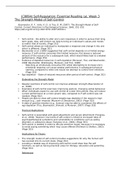(C8894) Self-Regulation: Essential Reading (a), Week 3
The Strength Model of Self-Control
Baumeister, R. F., Vohs, K. D., & Tice, D. M. (2007). The Strength Model of Self-
Control. Current Directions in Psychological Science, 16(6), 351–355.
https://doi.org/10.1111/j.1467-8721.2007.00534.x
Self-control - the ability to alter one’s own responses in order to pursue their long-
term goals. Also, self-control can help to bring an individual’s values and morals
to match that of society. (Page 351)
Self-control allows an individual to manipulate a response and change it into one
which is different. (Page 351)
Baumeister et al. (1994) suggested that self-control depends on a limited energy
resource. If self-control consumes this limited resource, this leaves a reduced
amount of the resource for a subsequent task, which would likely lead to a weaker
performance. (Page 351)
Evidence of depleted resources in self-regulation (Muraven, Tice, and Baumeister,
1998; Baumeister, Bratslavsky, Muraven, and Tice, 1998):
- Watching an emotionally evocative film whilst attempting to increase one’s
emotional response can cause weaker performance in subsequent physical
stamina, compared to when one would not attempt to control their emotions.
(Page 352)
Ego depletion – State of reduced resources after period of self-control. (Page 352)
Elaborating the Strength Model
Regular exertions of self-control can improve willpower strength (Baumeister et
al., 2006).
Examples of self-control exercises: Improving posture; changing verbal behaviour.
When individuals expect to use self-control at a later time period, they will reduce
current performance at a more severe rate, compared to if self-control was not
needed. (Page 352)
People are able to show self-control despite ego depletion if the reward is high
enough (e.g., cash rewards) (Muraven & Slessareva, 2003). (Page 352)
A state of positive emotion (e.g., humour) may be able to counteract the effects of
ego depletion (Tice, Baumeister, Shmueli, & Muraven, 2007). (Page 353)
Practical Applications
Self-control is associated with good adjustment and secure attachment (Tangney
et al., 2004). However, low levels of self-control is linked to increased rates of
psychopathological symptoms and vulnerability to conditions such as eating
disorders or substance abuse (Tangney et al., 2004). (Page 353)
Self-control is needed in order to discuss sensitive issues, because it is necessary
to avoid saying something which may cause offense (Richeson & Shelton, 2003).
(Page 353)
Implications for Theory
The strength model of self-control provides suggestions for why the human self
has evolved into its current state. (Page 354)
Locating a reliable way of improving self-control could show how the self
functions, as well as having practical value for therapy, education and parenting.
(Page 354)
References




